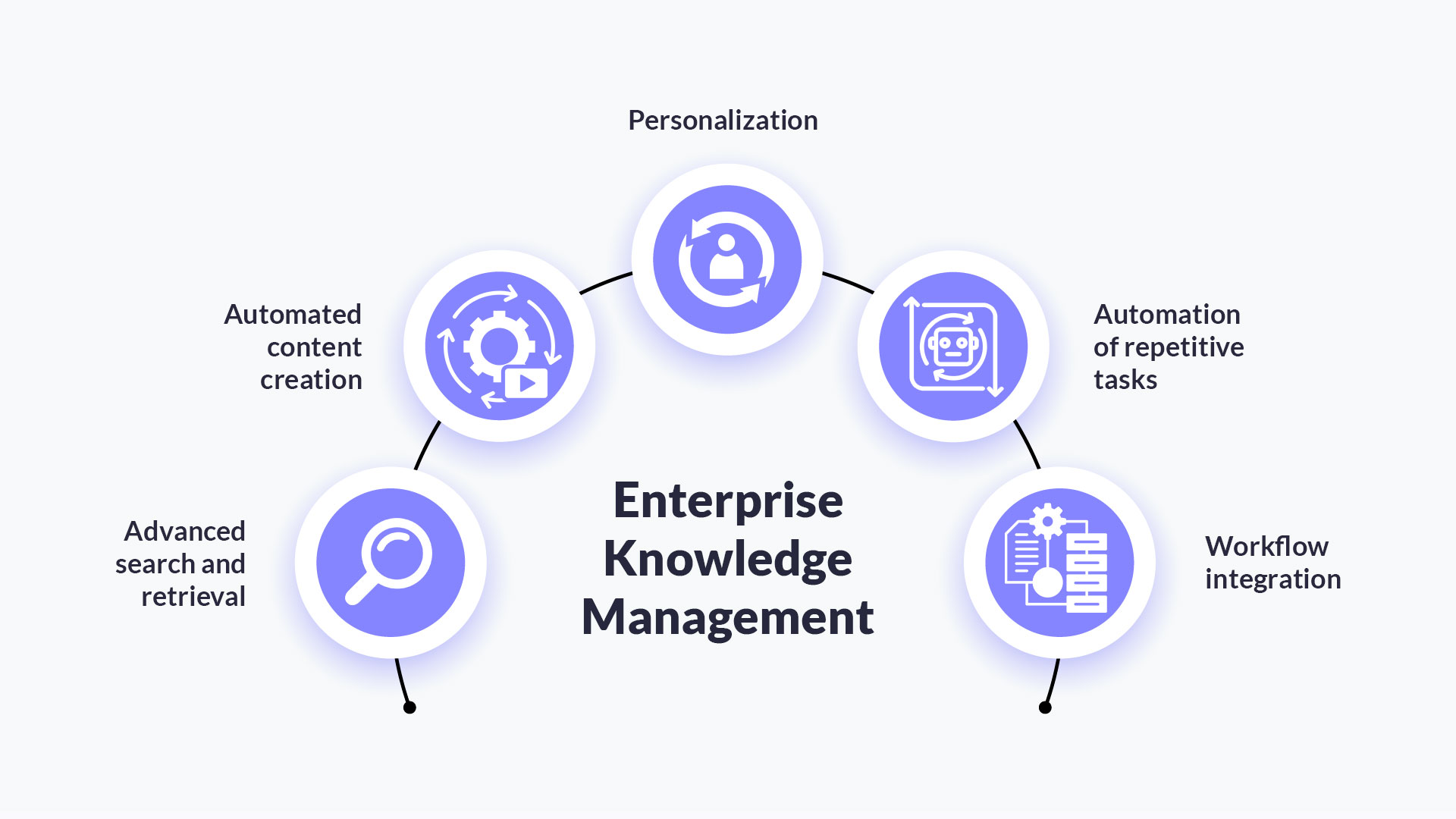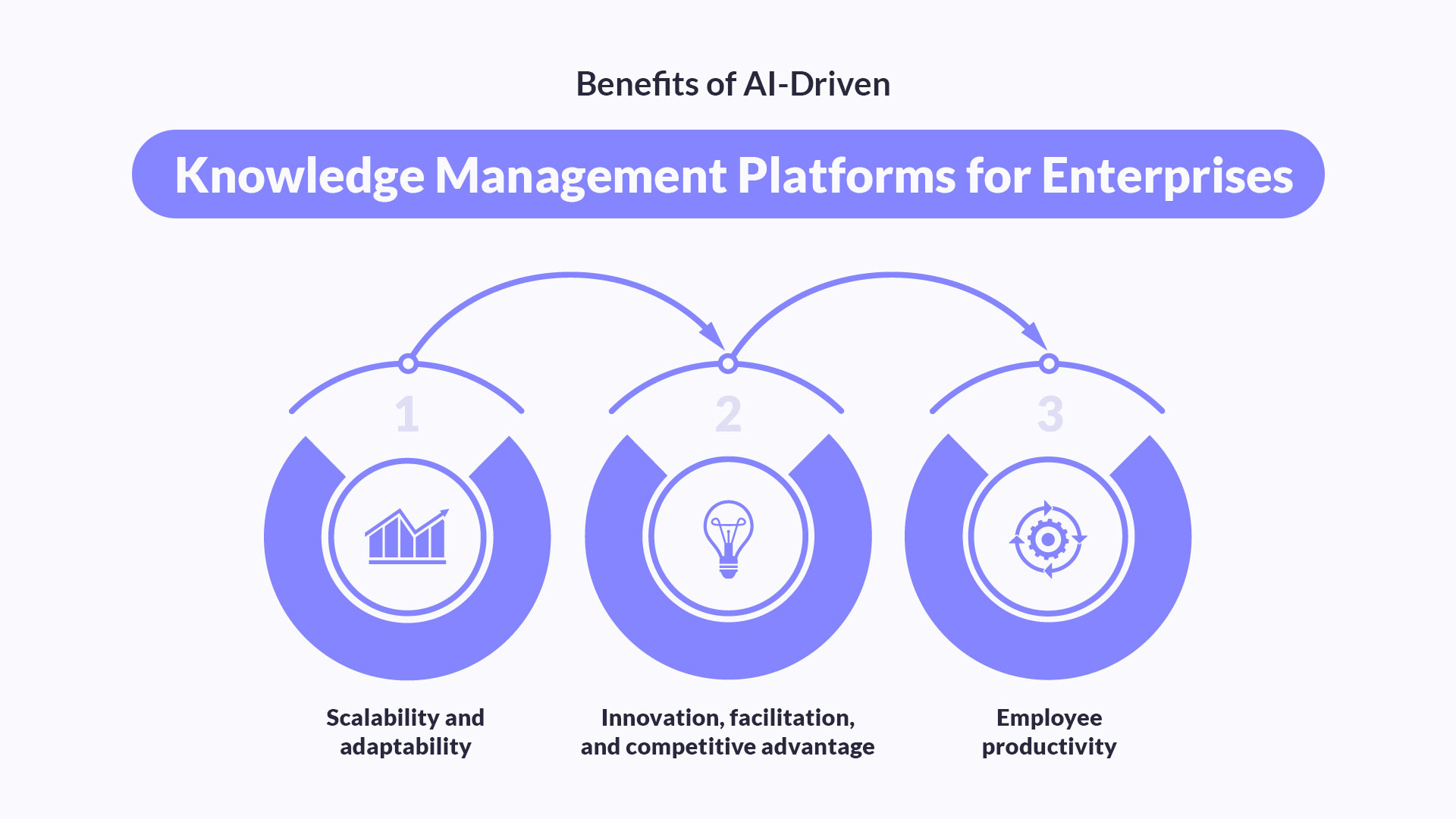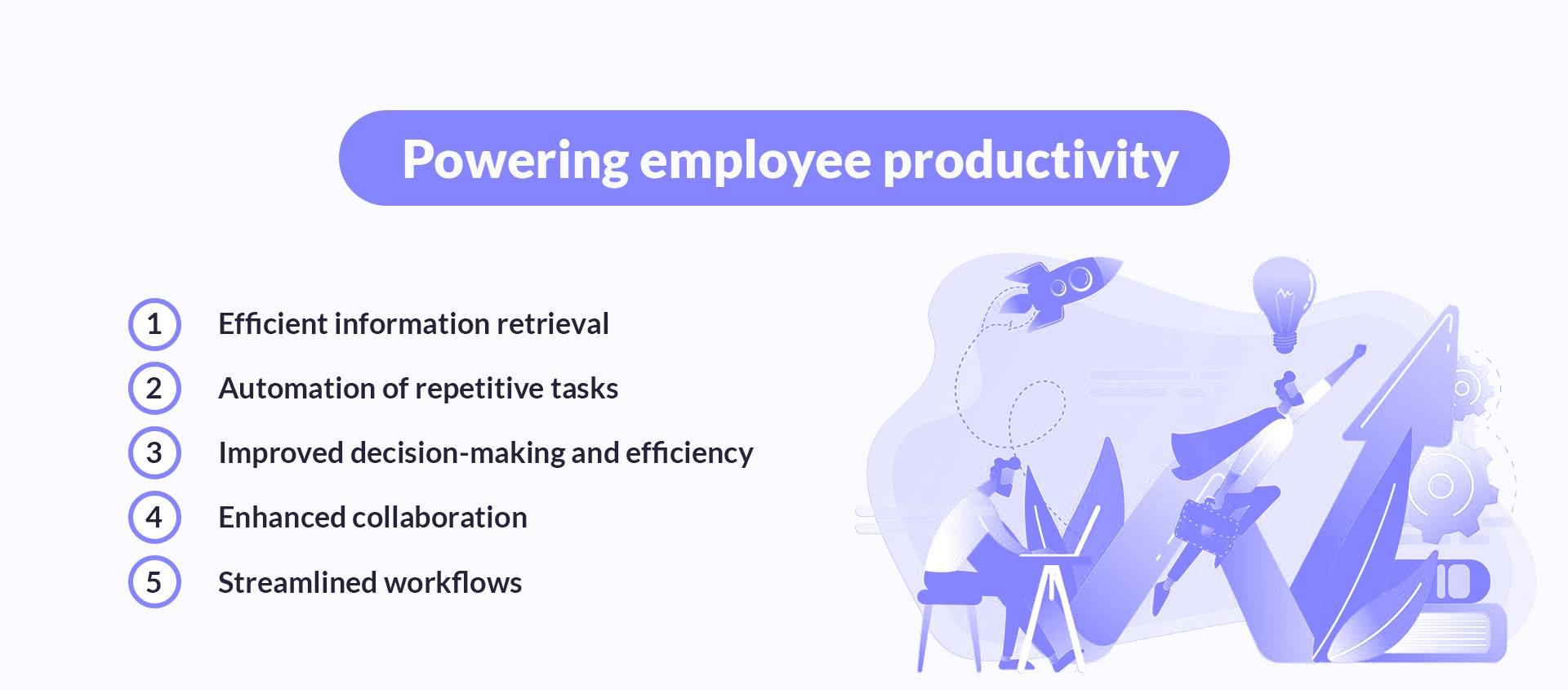A Gartner report predicts that AI will reduce support agent costs by $80 billion in 2026. It will be possible because of the role of artificial intelligence in knowledge management.
A knowledge management system (KMS) is a tool that stores your company’s knowledge content. Think of it as a digital filing cabinet. It has all the information your employees might need when stuck in a problem. For example, a new employee could figure out the solution to a technical issue without bothering their seniors.
Companies that implement AI in knowledge management systems enhanced the accessibility of information and took it one step further. Now, an AI-based KMS can predict the solution to a problem with maximum accuracy. With this advantage, it is like you’re providing each of your employees with a personal assistant who knows what they're looking for.
The benefits are many — it's time for your business to learn how to improve with the power of AI-enabled knowledge management (km). And we’re here to tell you how it can be a game-changing decision for your business.
How AI-driven KMSs are transforming the landscape of enterprise knowledge management

1. Advanced search and retrieval
AI-powered knowledge management, using advanced natural language processing, can interpret the context and intent behind queries like a human, providing highly accurate answers thanks to capabilities like semantic search and leveraging machine learning and AI algorithms.
A typical organizational KMS serves queries by matching keywords. But artificial intelligence knowledge management systems went further — they understand context and form cohesion, ensuring that the result is faster and provides a more relevant answer to the query. The result? Your employees find results faster than normal and spend less time searching for the information they need.
Moreover, your employees can explain their queries in their own words, and AI will understand them with greater accuracy, taking the request itself into account and more "humane" aspects, such as the department, past searches, and behavioral patterns.
Many companies are using AI content management featuring advanced search functionality. For example, Grammarly and Duolingo both use Glean — an AI-based knowledge discovery system. Glean integrates with your existing business tools like Google Drive and powers productivity for your employees by saving time from switching between tools multiple times.
2. Automated content creation
If your organization relies on organic traffic, you know the importance of search engine optimization (SEO). Creating content is an SEO tactic, and it's a labor-intensive job.
That’s where automated content creation comes into the picture, leveraging advanced language models. Companies like LinkedIn and CNET are already creating content with the help of an AI-powered internal knowledge base.
Here’s how it works for an enterprise. Explicit KM systems gather vast amounts of data. It can handle industry data, past articles, and company document management. The KMS then extracts key facts, statistics, examples, and talking points and structures them. Then, it uses these knowledge assets and SEO best practices to draft relevant content. Think long-form articles, blog posts, product descriptions, listicles, and others.
Take, for example, LinkedIn’s “collaborative articles.” These articles are created by AI in collaboration with the social network's users. LinkedIn's generative AI uses the company's data around job roles, skills gaps, emerging tech, and recruitment trends to generate the basic structure of these articles. After that, human writers and experts review the information and add their own contributions, giving these articles a human touch.

You may be interested
5 ways to benefit from machine learning in Edtech
Explore how machine learning can transform education with tailored learning paths, smart content creation and predicting student success.
Continue reading3. Personalization
Sales and marketing people know the importance of personalization. Your target audience is more likely to do business with you if you address them in a language they understand.
Until now, personalization wasn’t possible without a human. However, you can now automate personalization and improve your customer experience with the help of an AI knowledge management system.
Several companies are already using an AI-powered system to personalize various aspects of their business. You might remember being greeted with an intelligent chatbot on a website homepage or on customer support that treats you with human-like responses.
Generative AI, utilized in AI-powered knowledge bases, enhances personalization by leveraging natural language processing (NLP) technology. Such systems understand the human language and can respond in the same manner.
Consider an example of one of the most powerful supercomputers, IBM Watson. Panasonic and Humana use this technology in their knowledge management software to personalize customer experiences.
Although there are several use cases, personalization is typical in the customer service industry. For instance, an AI system can use your customer data and give suggestions on how to be more productive in the workspace.
4. Automation of repetitive tasks
One of the biggest advantages of AI-powered knowledge databases is handling repetitive tasks. Humans don’t need to do mundane tasks and use their time doing unproductive work. An AI knowledge platform can automate your employees' most repetitive tasks and help you lower operating costs.
For instance, a company can replace many of its customer support agents' jobs with a chatbot to address the most common customer problems. A popular business in this space doing something similar is Intercom. Amazon, Atlassian, and Microsoft use Intercom, which defines itself as a self-serve AI system.
Further, an AI knowledge management base also helps you with decision-making. AI knowledge management software gives you crucial data points from customer interactions, providing you with a much deeper understanding of your clients and increasing customer satisfaction over time. Without AI, it’s a mundane and tedious job requiring numerous repetitions.


Thank you for Subscription!
5. Workflow integration
AI and knowledge management integrate into your workflows to aggregate the information your employees need in one place. No more switching between scattered software platforms.
Imagine getting personalized information from your CRM on your Slack channel with the help of artificial intelligence (AI). Moreover, what if these insights were tailored to your executive priorities? It would save time for you and boost the organization's knowledge & productivity.
Shelf Next-Gen KMS is one of the knowledge management solutions that is used by some of the best startups like HelloFresh, Glovo, and OPEX. This KMS brings the power of generative AI to the day-to-day business tools you use, such as Zendesk, Slack, Google Drive, and Chrome.
An AI-based KMS can also automate reporting. So you spend minutes, not hours, compiling knowledge that speeds up your decisiveness. This will give you more time to innovate and do what you do best — thinking creatively, problem-solving with emotional intelligence, and building relationships.
Benefits of AI-driven knowledge management platforms for enterprises

1. Scalability and adaptability
In business, what works today may not work tomorrow. The market and people’s demands change over time, and knowledge management tools can help you adapt and scale.
Knowledge management AI systems are like virtual assistants that learn on the go. These AI tools deal with large volumes of data and adapt as business needs change, ensuring effective knowledge sharing across your company. With every interaction, they improve, which helps them stay relevant in the future as business dynamics change.
Further, such an AI-powered knowledge base system can automate tasks and reduce the chances of errors, and your employees may focus more of their energy on projects that need human thinking. Consequently, you save time and money that you can further invest to scale.
All this makes your business efficient. In this context, AI knowledge management helps in scaling your business and being adaptive to the market.

Some insights for you
AI and predictive analytics: a powerful combination for business growth
Discover how AI and predictive analytics team up to supercharge business growth.
Explore2. Innovation, facilitation, and competitive advantage
AI-powered knowledge management systems, particularly those leveraging AI generative, make knowledge sharing and collaboration within an organization easy. Your employees can tap into the wealth of explicit knowledge and handle tasks without prior training. This easy access is a boon for problem-solvers who are the driving force of innovation. For instance, a new employee can access and share knowledge base and figure out a solution to the problem on which they’ve not been trained yet.
Further, AI-based systems give you a competitive edge by improving the customer experience of your business. How so? Suppose your enterprise deploys AI-powered chatbots instead of humans as customer support. This intelligent chatbot is efficient and makes fewer errors than a human. Such AI tools have your company’s know-how, which gives them the ability to provide accurate solutions in a few clicks.
An AI knowledge base helps you understand your customers at a deeper level so that you target the right customers with the right products at the right time.
3. Employee productivity
Employee burnout is common these days. Enterprises want their employees to become more productive, but it is simply not possible without technology. A ResearchGate study shows that AI-based knowledge management practices reduce the workload for employees, increasing employee engagement and satisfaction rates.
The fusion of artificial intelligence and knowledge management is a good step in this direction. With the help of AI knowledge bases, tedious tasks that affect employees' mental health are now done by AI-powered knowledge management software.
Here are some ways an AI-based knowledge manager is powering employee productivity:
- Efficient information retrieval
- Automation of repetitive tasks
- Improved decision-making and efficiency
- Enhanced collaboration
- Streamlined workflows

If you’re looking to upgrade your knowledge management system, it’s the right time to do so. You can get help from our AI-powered app development services. We have a hard-working and passionate team of AI app developers with extensive experience working on AI-powered technologies and building amazing AI apps.
Key features for AI knowledge management software
Recent updates in AI driven knowledge management systems have brought in some cool new features that are making things a lot easier. Incorporating AI knowledge management platform pay attention to the next features:
Personalized user experience
AI-powered knowledge hubs should offer more personalized experiences. By predicting what users need and serving up relevant content automatically, users can find what they’re looking for without needing to know much about the system. You’ll see things like content suggestions, related articles, and chatbots that offer helpful answers.
Better search and retrieval
Searching for information just got a lot easier. Instead of digging through a complex knowledge repository, AI in knowledge management does the heavy lifting, finding and retrieving the information you require quickly. This saves users a ton of time and hassle.
Automated knowledge creation
When it comes to creating repetitive content with only slight changes, AI can handle it for you. This automation saves time and cuts down on errors, making content production smoother and faster.
Easy article outline creation
AI for knowledge management can now whip up article outlines automatically, giving you a solid framework to work with. You just need to fill in the details, making content creation much simpler and more focused.
Smart content review
Knowledge management with AI can also polish your content by checking for grammar, typos, and flow. It can adjust the tone, optimize for SEO, or even simplify the language, helping you produce better, more professional content.
Quick article title generation
Creating catchy, SEO-friendly titles is no longer a chore. AI can generate titles that are perfectly optimized for search engines, helping your content get noticed more easily.
SEO-optimized meta descriptions
Like with titles, AI can create content for meta descriptions that are optimized for search engines, improving the chances of your content being found.
Auto tag generation
AI can automatically generate relevant tags for your articles, making it easier for users to find what they’re looking for and keeping related content organized.
Suggesting related Articles
AI can suggest related articles to users, helping them discover more content without much effort. This keeps users engaged and helps them learn more about your products or services.
Predictive analytics
With AI, you get better insights into how your knowledge base is performing. It can predict knowledge gaps, forecast trends, and help you create reports, making it easier to stay ahead of the curve.
Summarizing content
Sometimes users don’t need the full article, just a quick summary. AI technologies can generate these summaries, giving users the key points without all the extra details.
AI-powered vs. traditional knowledge management
As we mentioned above, AI-powered tools are redefining knowledge management and the way organizations handle their information. Compared to traditional methods, AI transforming knowledge management brings more automation, efficiency, and personalization to the table. Below is a comparison of key features between AI-powered and traditional knowledge sharing systems:
Feature | AI-powered knowledge management | Traditional knowledge management |
Personalization | Delivers personalized recommendations and anticipates user needs. | Relies on manual navigation and user knowledge of the system. |
Search and retrieval | Automated, quick AI powered search, retrieving relevant information instantly. | Manual searching through a structured hierarchy; time-consuming. |
Content creation | Automates repetitive tasks like content generation and tagging. | Requires manual content creation and tagging by users. |
Content review | AI reviews and refines content for grammar, tone, and SEO optimization. | Manual review and editing, which is time-intensive |
Analytics & data analysis | Predictive analytics provides advanced insights and predicts content gaps or trends. | Basic analytics with limited predictive capabilities. |
User engagement | Suggests related articles and generates content summaries automatically. | Users must manually search for related content and summaries. |
The future of AI in knowledge management
AI-powered KM tools have disrupted almost every industry. As its capabilities continue to grow, you can expect it to become more powerful in handling the most complex tasks. It may not completely replace human intelligence, but it will prove to be a big accelerator for growth.
Here’s how the future of AI-based knowledge management looks:
- An AI-based KMS will provide a more personalized and improved customer experience. It’s like businesses giving away a personal virtual assistant to customers who’ll know their preferences.
- AI-powered knowledge management will continue to automatically capture vast amounts of data, organize it, and improve knowledge delivery.
- The system will be able to make sense of structured and unstructured big data to support analytics and decision-making.
- AI will be a workforce partner for more than 90% of companies by 2025, per Gartner. This means an AI knowledge base will become a necessity for every crucial industry: healthcare, finance, retail, and more.
- Companies will use an AI-based knowledge management process for drug discovery and fraud detection and to enhance the value they offer to their customers.
Conclusion
Knowledge management and AI technology together offer a major upgrade to enterprises. They help to easily get the needed information, produce relevant content, take over repetitive tasks, predict customer needs, and streamline operations.
Think of it as an incredibly capable personal assistant available company-wide. Your team saves effort on tedious tasks and focuses energy on meaningful projects. Customers enjoy smooth service based on relevant knowledge that anticipates their needs. Overall efficiency lets you expand your business while costs decline.
As the integration of artificial intelligence in knowledge management increases, you’ll gain sharper insights from big-picture data to inform decisions. Service becomes highly tailored to individuals. By 2025, the majority of companies will adopt this tool to get ahead of the competition, as predicted by Gartner.
So, it’s time to throw away the hassles and limitations on your mind. Transitioning to an intelligent knowledge base paves the way for unlocking your business' full potential. Join the top companies leveraging knowledge management tools to reach new heights of success.





















